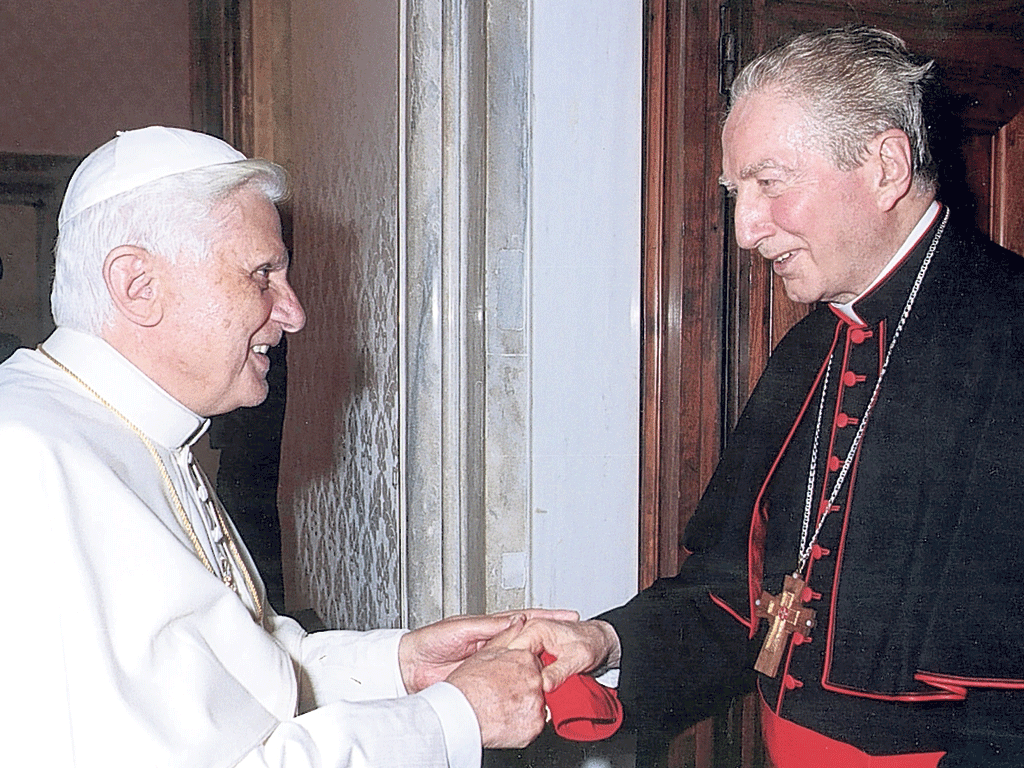Cardinal Carlo Maria Martini: Priest who believed the Catholic church is '200 years out of date'

Cardinal Carlo Martini, once considered as a possible successor to Pope John Paul II, was one of the Roman Catholic Church's most influential progressive thinkers, who clearly excited many forward-thinking Catholics. But in equal measure he was viewed as an extremist by more traditional Catholics, in particular the Papacy itself. He nevertheless commanded great respect from both Pope John Paul II and his successor Benedict XVI.
In the latter years of John Paul II's tenure, Martini was frequently mentioned as a contender to succeed him, especially by members of the church's progressive wing. However, under John Paul, the College of Cardinals had become increasingly conservative, and when the Pope died in 2005, Martini, by this time 78 years old, had been suffering from Parkinson's Disease since 2002, and was overlooked by the conclave, who chose the German Cardinal, Joseph Ratzinger, a hard-line defender of the faith.
As Archbishop of Milan, Martini – an accomplished academic, biblical scholar and able to speak 11 languages – dismissed the usual ceremonial trappings as "pompous," choosing a simple clerical collar and suit. He had the popular touch, and was known for his inclusive approach, choosing to visit prisons, hospitals and down-and-outs as well as producing several books a year on social issues and publishing meditations on the Christian life. He drew young people to the Church by presenting a series of forums in which believers, atheists and agnostics met to discuss issues of mutual concern. In Italy, a country often perceived as suffering from institutional corruption, he was regarded by his admirers as a beacon of moral authority.
Catholics lacked confidence in the Church, he explained. "Our culture has grown old, our churches are big and empty and the church bureaucracy rises up, our religious rites and the vestments we wear are pompous." Although his views and stances often brought him into direct conflict with the Vatican, he never directly criticised John Paul, or the inner circle who eventually ran the papacy for him. He was too subtle for that and remained resolute. Martini never advocated the throwing-out of Catholicism's entire, elaborate rulebook, though his disapproval was clear.
Martini's differences with the Vatican were always diplomatically expressed; he advocated reform on issues such as contraception and the role of women in the Church, which angered traditionalists. He even suggested a third Vatican Council to modernise some central aspects of Roman Catholic dogma; and when in September 2007 the 16th-century Tridentine Mass was reintroduced as an option for Roman Catholic churches, Martini said he would refuse to celebrate it. He did not, however, openly support women priests.
He also expressed notably liberal views on issues relating to health, believing the Church's stance had probably driven away many of the faithful. In 2006 he challenged official church policy by arguing that condom use was justified in some cases to prevent the spread of Hiv/Aids and could "in some situations, be a lesser evil". But he did not suggest, as some claimed, that the Church's continuing (though widely ignored) prohibition on "artificial contraception" be totally abandoned.
Martini also characterised the legalisation of abortion as a "positive" development, inasmuch as it could "reduce or eliminate" illegal abortions. He added, however, that the availability of legal abortion should not be construed as a "licence to kill."
Always looking for ways to increase numbers rather than alienate groups, Martini believed the Church needed to adopt a more generous attitude towards divorced people, otherwise it would lose the allegiance of future generations. The question, he suggested, was not whether divorced couples could receive Holy Communion, but "how the Church can help complex family situations". In 2007, Martini expressed qualified support for a patient's right to die, urging the Vatican to honour the requests of terminally ill patients who ask "in all lucidity" for life-prolonging treatments to be withdrawn.
Born in the small town of Orbassano, near Turin, in 1927, Carlo Maria Martini was the son of Olga and Leonardo, an engineer. Educated at a local Jesuit school, the Istituto Sociale, he joined the Jesuits at the age of 17 and was ordained at 25. Over the next three decades he undertook two doctorates in Rome and embarked on an academic career, becoming rector of the Pontifical Biblical Institute in Rome in 1969, and of the whole Gregorian University that houses it in 1978.
In 1979, a year after his appointment as Pope, Jean-Paul II appointed Martini Archbishop of Milan, Europe's largest archdiocese. His impact was immediate. Martini retired in 2002 having also served as head of the European Bishops' Conference (1987-93), seeking to try to resolve differences during the civil war in the former Yugoslavia through meetings between the Orthodox Patriarch, the Cardinal Archbishop of Zagreb and representatives of the Muslim communities.
Martini moved to Jerusalem to study for several years before returning to Italy in 2008, spending his final years in a Jesuit retreat in Gallarate near Milan. In an interview published after his death, Martini described the Church as "200 years out of date" and urged the Church to recognise its errors and embark on a radical path of change, adding that in order to conquer the tiredness of the Church a "radical transformation, beginning with the Pope and his bishops" was required.
Carlo Maria Martini, priest, scholar and author: born Orbassano, Italy 15 February 1927; died Gallarate, Varese 31 August 2012.
Subscribe to Independent Premium to bookmark this article
Want to bookmark your favourite articles and stories to read or reference later? Start your Independent Premium subscription today.

Join our commenting forum
Join thought-provoking conversations, follow other Independent readers and see their replies